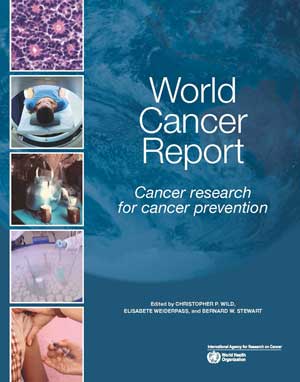Focus
World Cancer Report is an IARC publication. The co-editors are former IARC Director Dr Christopher P. Wild, IARC Director Dr Elisabete Weiderpass, and Dr Bernard W. Stewart of the University of New South Wales, Sydney, Australia. The co-editors have determined that the new World Cancer Report will have a specific focus on cancer prevention and the research that underpins prevention.
Director Dr Elisabete Weiderpass, and Dr Bernard W. Stewart of the University of New South Wales, Sydney, Australia. The co-editors have determined that the new World Cancer Report will have a specific focus on cancer prevention and the research that underpins prevention.
The previous World Cancer Report was among a spectrum of authoritative publications documenting that the number of cases and the number of deaths from cancer worldwide will progressively rise over the coming decades. In particular as a proportion of national populations, this rise will increasingly be most marked in low-income countries. Dr Wild has highlighted cancer prevention as the option that may best address the increasing cancer burden, by concluding, “We can′t treat our way out of the cancer problem.”
Cancer research for cancer prevention rests on the foundation of knowledge about the extent of the cancer burden for the world′s population as a whole, and then with reference to the incidence of cancer in different regions and countries. The reason why particular tumour types are the major issues in some countries or communities and not in others reflects, to a large extent, the differing causes of cancer and the fact that some cancer (sporadic cancer) occurs without any discernible relationship with causal agents.
Individuals differ in both the extent of their exposure to carcinogens (cancer-causing agents) and their response to such agents. The scope of biological processes that influence cancer development is broad and is basic to influencing just how much cancer of what particular type occurs in a country or region. Increasingly, in common with all aspects of medical research, biological processes influencing cancer development are being analysed and understood with reference to molecular mechanisms, and in particular with reference to genetic information, sometimes referred to as genomics.
Biological processes are far from the only factors that affect cancer development in different communities. Differences in behaviour and differences in social circumstances, often correlated with racial, class, or community-based inequalities, are increasingly researched as critical to the design and efficacy of cancer prevention initiatives. This aspect of cancer research will also be addressed in the new World Cancer Report.
Cancer prevention is achievable, as indicated by downturns, in some countries and communities, in the amount of cancer attributable to tobacco or sun exposure and, in cases of cancer caused by infectious agents, as achieved by vaccination. Other cancers, including cervical, breast, and colorectal cancer, have been reduced in incidence by earlier detection and improved access to treatment as a consequence of national screening programmes. Integrating all such research for optimal and concise presentation will be the primary responsibility of the editors of the next World Cancer Report.
